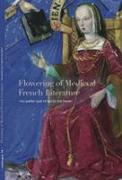- Start
- Flowering of Medieval French Literature
Flowering of Medieval French Literature
Angebote / Angebote:
Although the earliest records of written French date from the 9th century, it was not until the 13th century, when there was an explosion of texts in the 'mother tongue', that French became widespread as a written language. And only in 1539, by King Francis I, was French deemed the official language of the kingdom.This beautifully illustrated catalogue explores the rise, affirmation, and triumph of the French vernacular, focusing on a group of sixteen manuscripts all written in the French language between about 1300 and 1525. Because many of these manucscripts are virtually unknowna nd previously unpublished, first-hand study of them offers a unique opportunity to reassess certain approaches to later medieval French literature. Mostly illuminated, the manuscripts are widely diverse. They are written in verse and in prose. Some are translations from the Latin, others new compositions entirely in French. They treat a wide variety of subjects ranging from literature and science, to philosohpy and theology, and to history and goverment. There are some unique texts that exist only in the manuscripts included here. A significant nuber of the volumes boast royal provenance. There are signed and dated works by newly identified scribes, as well as works by famous calligraphers. Some of the manuscripts still have their original bindings.PRefaced with an introductory essay by Sandra Hindman, the catalogue divides the manuscripts into five sections: I) Literature and Science: The Rise and Affirmaton of the Vernaular, II) Philosophy and Theology: Translations and Adaptations of the Classics, III) History and Genealogy: the Nation and the Individual, IV) Women Writers and Women Bibliophiles: Memory and Self-Assertion, V) From Manuscript to Print: The Circulation of Texts and the Triumph of the French Vernacular.Published to accompany a travelling exhibition at Les Enluminures gallery in New York and in Paris as well as a colloquium at the Institut national d'histoire de l'art (INHA), this publication will shed new light on many of these themes and, it is hoped, contribute to the ongoing re-evaluation of medieval literary history and medieval art history. Each work will be catalogued with detailed scholarly descriptions and comparative material.
Folgt in ca. 15 Arbeitstagen
